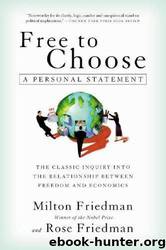Free to Choose: A Personal Statement by Milton Friedman & Rose D. Friedman

Author:Milton Friedman & Rose D. Friedman
Language: eng
Format: mobi, epub, azw3
Tags: Political Freedom, Theory, Welfare State, economics, Social Policy, General, Political Science, Industrial Policy, Public Policy, Capitalism, Free Enterprise, Business & Economics
ISBN: 9780156334600
Publisher: Mariner Books
Published: 1990-11-26T00:00:00+00:00
Who Protects the Consumer?
225
foreign cars. They were never able to attract more than a small fraction of the total custom. If that was what consumers really wanted, the companies that offered that option would have prospered, and the others would have followed suit. The real objection of most critics of advertising is not that advertising manipulates tastes but that the public at large has meretricious tastes —that is, tastes that do not agree with the critics'.
In any event, you cannot beat something with nothing. One must always compare alternatives: the real with the real. If business advertising is misleading, is no advertising, or government control of advertising, preferable? At least with private business there is competition. One advertiser can dispute another.
That is more difficult with government. Government, too, engages in advertising. It has thousands of public relations agents to present its product in the most favorable light. That advertising is often more misleading than anything put out by private enterprises. Consider only the advertising the Treasury uses to sell its savings bonds: "United States Savings Bonds . . . What a great way to save!" as the slogan goes on a slip produced by the U.S. Treasury Department and distributed by banks to their customers. Yet anyone who has bought government savings bonds over the past decade and more has been taken to the cleaners.
The amount he received on maturity would buy less in goods and services than the amount he paid for the bond, and he has had to pay taxes on the mislabeled "interest." And all this because of inflation produced by the government that sold him the bonds!
Yet the Treasury continues to advertise the bonds as "building personal security," as a "gift that keeps on growing," to quote further from the same slip.
What about the danger of monopoly that led to the antitrust laws? That is a real danger. The most effective way to counter it is not through a bigger antitrust division at the Department of Justice or a larger budget for the Federal Trade Commission, but through removing existing barriers to international trade.
That would permit competition from all over the world to be even more effective than it is now in undermining monopoly at home. Freddie Laker of Britain needed no help from the Department of Justice to crack the airline cartel. Japanese and German 226
FREE TO CHOOSE: A Personal Statement
automobile manufacturers forced American manufacturers to introduce smaller cars.
The great danger to the consumer is monopoly—whether private or governmental. His most effective protection is free competition at home and free trade throughout the world. The consumer is protected from being exploited by one seller by the existence of another seller from whom he can buy and who is eager to sell to him. Alternative sources of supply protect the consumer far more effectively than all the Ralph Naders of the world.
CONCLUSION
"The reign of tears is over. The slums will be only a memory. We will turn our prisons into factories and our jails into storehouses and corncribs.
Download
Free to Choose: A Personal Statement by Milton Friedman & Rose D. Friedman.epub
Free to Choose: A Personal Statement by Milton Friedman & Rose D. Friedman.azw3
This site does not store any files on its server. We only index and link to content provided by other sites. Please contact the content providers to delete copyright contents if any and email us, we'll remove relevant links or contents immediately.
Spell It Out by David Crystal(36109)
Life for Me Ain't Been No Crystal Stair by Susan Sheehan(35800)
Cecilia; Or, Memoirs of an Heiress — Volume 1 by Fanny Burney(32544)
Cecilia; Or, Memoirs of an Heiress — Volume 2 by Fanny Burney(31940)
Cecilia; Or, Memoirs of an Heiress — Volume 3 by Fanny Burney(31928)
The Great Music City by Andrea Baker(31915)
Professional Troublemaker by Luvvie Ajayi Jones(29648)
The Secret History by Donna Tartt(19044)
We're Going to Need More Wine by Gabrielle Union(19033)
Twilight of the Idols With the Antichrist and Ecce Homo by Friedrich Nietzsche(18619)
All the Missing Girls by Megan Miranda(15942)
Cat's cradle by Kurt Vonnegut(15331)
Pimp by Iceberg Slim(14481)
Bombshells: Glamour Girls of a Lifetime by Sullivan Steve(14050)
For the Love of Europe by Rick Steves(13891)
Talking to Strangers by Malcolm Gladwell(13344)
Norse Mythology by Gaiman Neil(13343)
Fifty Shades Freed by E L James(13231)
The Social Justice Warrior Handbook by Lisa De Pasquale(12185)
